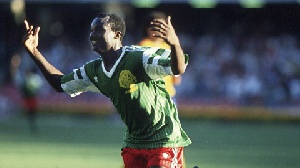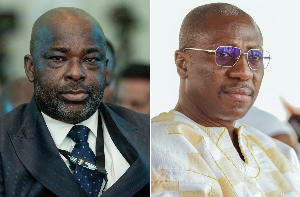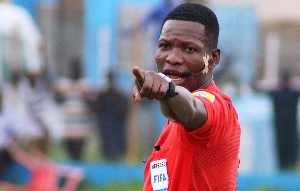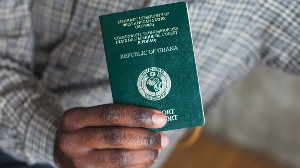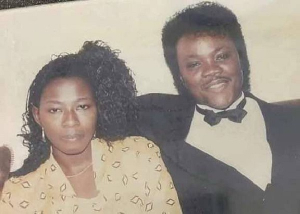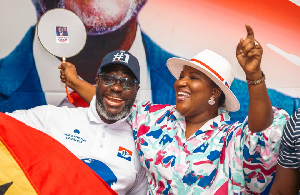When he came on against Russia in his side’s final group match at the 1994 FIFA World Cup USA – played at Stanford Stadium, Palo Alto on Tuesday 28 June – Cameroon’s Roger Milla took just a minute to enter the annals of football history.
With the Africans trailing 3-0 at half-time to an Oleg Salenko hat-trick, Cameroon’s French coach, Henri Michel, decided to bring on his veteran striker, who at the time became the oldest player ever to take part in a World Cup match (a record that has since been beaten, first by Colombia’s Faryd Mondragon at Brazil 2014 and then by Egypt’s Essam El Hadary at Russia 2018).
The evergreen Milla did not stop there, however. Within a minute of coming on, he picked the ball up on the edge of the box, held off the challenge of Dmitriy Khlestov and shot home past Stanislas Cherchesov. It was a goal that gave him another record – that of the oldest scorer in a World Cup match, a distinction he still holds today. To mark the 24th anniversary of a remarkable match that ended in a 6-1 win for the Russians, FIFA.com spoke to the legendary Cameroonian.
FIFA.com: It was 26 years ago today that you came on against Russia and became the oldest player to score in a World Cup match. How did you feel at the time?
Roger Milla: Very, very pleased, as you could see in my celebration, even though we ended up losing the match. I’m still very proud of it today. To my mind, that goal and that record showed the people who doubted me that I still had it in me, despite my age. Physically, I wasn’t 100 per cent, but I still had my technique. It’s a lovely record.
Is that goal the thing you’re most proud of in your career?
No, I don’t think so. It’s a fine individual achievement but nothing gave me more satisfaction than helping Cameroon reach the quarter-finals of the World Cup in 1990. That was historic for our country and our continent.
When you arrived in the USA for the World Cup did you have those records on your mind?
I don’t think at all about individual performances when I walk on to the pitch and even less so before a competition. The idea of beating that record didn’t even cross my mind. If I score and we don’t win, I’m every bit as disappointed as my team-mates. We all wanted to do even better than we’d done in 1990, but unfortunately, we didn’t manage it.
Where do you rank your record among all the great World Cup records?
Every record has its own story behind it. I couldn’t put one ahead of another. Every one of those players has made their mark on the World Cup in their own little way. As a goalscorer, I can obviously identify with the records of [Miroslav] Klose and Just Fontaine but I couldn’t rank them. My record is just one of many. For me, the only record that really stands out is that of ‘O Rei’ Pele with his three World Cups. Words can’t describe what he achieved at such a young age.
Do you think your record will be beaten one day?
Nothing’s impossible but it’ll be very difficult to beat. Football’s a very different sport today and it’s really hard to see anyone other than a keeper getting capped at the age of 42. And, as we all know, keepers don’t score very often. I think my record has got a few good years left in it yet.
Oleg Salenko scored five that day, a record he still holds. Were you impressed with his achievement?
You can’t be anything but impressed with a performance like that, especially in a World Cup, though I have to say that we had a hand in it. We weren’t good enough in that match. We both set records that day, which is why we had our photo taken together at the end of the game. History-makers stand together in Stanford
At the time, what stayed with you from that match: the heavy defeat or your record?
It was a mix of emotions because we got knocked out and we were so disappointed we hadn’t lived up to the expectations people had of us. I also knew that I’d played my last match at the World Cup and that I was saying goodbye to the competition. So I just tried to put it into perspective and make the most of every moment. At the time, I didn’t think a lot about the record because the goal had little impact on the game. But as the years have gone by it’s taken on its full meaning and I’m very proud of it.
What about now? Do you still feel the same about it?
When I look back I try to focus on the positive, which is the record. I’ve still got a few regrets because it was my last World Cup and I would have liked to have gone further and end on a better note.
Let’s go back four years earlier, to Italy 1990, when Cameroon became the first African team to reach the World Cup quarter-finals. Can you remember how you felt at the time?
You couldn’t describe it. There was a lot of joy obviously. We were so happy and it gave us a real confidence boost. We would have loved to have gone further because we really had what it took to do more. I don’t want to get into a debate about the England match, but when I look back on it now there are a few regrets. I’m convinced we could have gone all the way. We were welcomed as heroes when we returned to Cameroon and that was when you realise that you’ve achieved something big.
You opened the way for other teams from Africa but to date only Senegal in 2002 and Ghana in 2010 have matched your achievement. What does African football need to do to make the last four?
Senegal and Ghana showed that it was possible. We’re still some way behind European football so it’s going to be difficult to get there, but I’m still optimistic. I get the feeling that the current generation of players sometimes lack confidence and determination, like us at the time. We have to believe in ourselves if we want to put in those kinds of performances at every World Cup.
Cameroon have had Roger Milla and then Samuel Eto’o. Who will lead the way for the Indomitable Lions in the years to come?
I’ve got no idea. There’s not really anyone who stands out at the moment. It’s maybe better that way because it gives us the chance to really focus on the team. I don’t see anyone around right now with my qualities. Samuel Eto’o did some great things too. We are unique players and there’s nobody like us. All we can do is wait for Cameroon to shine in the future.
Can you see Cameroon qualifying for the World Cup quarter-finals once again and perhaps going even further?
I hope they do but I know it’s going to be tough. It’s performances like that, though, that can inspire future generations. If it’s going to happen, then we need Africa’s big-name players to step up when they play for their national teams, which is not always the case.
Thanks to Sadio Mane, Mohamed Salah, Pierre-Emerick Aubameyang and Riyad Mahrez, Africa is playing a starring role in the football world today. Do you think the continent has caught up with Europe and South America?
In terms of individual talent, the gap between African players and players from Europe and South America is closing all the time. I think it’s on a team level that we have to keep on developing and it’s players like Mane and Salah who can bring their expertise to bear in that respect. They play for big clubs and they know how to bring a team together in pursuit of a shared objective. In a few years there won’t be any difference between us and them. Learning from our mistakes and working together are two things that will help us to go even further.
Africa Sports News of Saturday, 4 July 2020
Source: fifa.com

